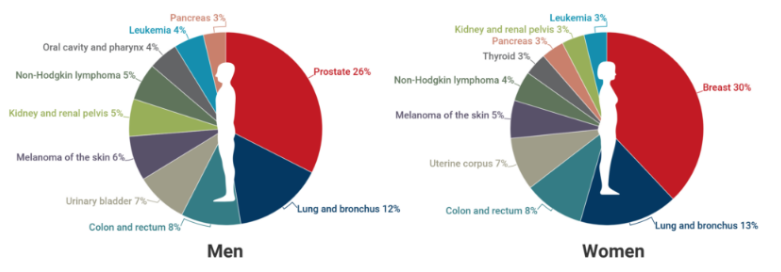Blog Author: Archita KhaireCancer is the second leading cause of death in the world after cardiovascular diseases. The World Health Organization reported 18 million new cancer cases and 9.5 million cancer deaths across the globe in 2020, approximately 49,000 new cases and 26,000 deaths every day. Cancer also has significant and increasing impacts on the economy. The annual economic cost of cancer is estimated at approximately $1.16 trillion. There was a time when cancer was essentially a death sentence. However, in the last few decades, researchers across the world have made major advances in the mechanics behind how to prevent, diagnose, and treat cancer. Artificial Intelligence is now rapidly changing the field of oncology. From enhancing diagnosis to personalizing treatment to discovering novel anticancer drugs, AI has made significant contributions to various aspects of oncology research in just a few years. Cancer is not a single ailment, rather there are many types affecting human health. The picture below depicts a few different types for men and women. With the advent of machine learning, there are now algorithms for the diagnosis, prognosis, and treatment of virtually every type of cancer. Machine learning algorithms hold promise for delivering faster and more-consistent cancer diagnoses. #Digital pathology powered with AI is making a remarkable difference in the diagnosis of cancer. Google's deep learning algorithm can detect breast cancer with an accuracy of 99%.
A cancer prognosis typically involves multiple physicians from different specialties using subsets of biomarkers and multiple clinical factors, including the age and general health of the patient, the location and type of cancer, as well as the grade and size of the tumor. Even for the most skilled clinicians, this is not an easy task. Similar challenges exist when it comes to the issue of cancer prevention and prediction of cancer susceptibility. In the last two decades, a variety of machine learning techniques and feature selection algorithms have been widely applied to cancer prognosis and prediction. The Cancer Genome Atlas (TCGA), a landmark cancer genomics program, has molecularly characterized over 20,000 primary cancer and matched normal samples spanning 33 cancer types. Studying the tumor as a whole, as well as the non-cancerous cells that were part of it, was not possible before TCGA was available. The integration of AI with the Cancer Genome Atlas has been able to transform big data into clinically actionable knowledge and is expanding to become the foundation of precision medicine for cancer. In the next few blogs, we will delve deeper into the advancements in AI for each type of cancer. Comments are closed.
|
Page HitsAuthorArchita Archives
January 2023
Categories |


 RSS Feed
RSS Feed